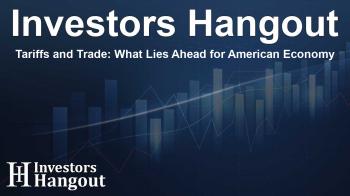Tariffs and Trade: What Lies Ahead for American Economy

The Ongoing Tariff Debate Under Trump
As we navigate through the complexities of trade policy, it’s evident that President Donald Trump’s approach to tariffs continues to evolve, and so do the implications for the economy. Despite earlier expectations that Trump would soften his stance as the next election cycle approaches, it seems his trade maneuvers are only intensifying.
The state of the economy remains relatively strong, characterized by low levels of unemployment and manageable inflation rates. The current labor market shows signs of full employment, which has sparked discussions about the potential consequences of Trump’s aggressive tariff policies as we approach critical election periods.
The Current Economic Landscape
At present, the economic indicators tell a favorable story—unemployment is hovering around 4.1%, and inflation rates are under control, significantly below the historical averages. This seemingly positive outlook begs the question: Why would Trump risk jeopardizing this success with further tariffs?
Historically, tariffs have been a contentious issue. They can protect domestic industries but can also lead to retaliatory actions from other nations, which may harm American businesses. The ongoing struggle between maintaining beneficial trade relationships and pursuing a nationalistic economic agenda appears to be a tightrope walk for the Trump administration.
The Impact of Tariffs on Markets
Recent announcements indicate that additional tariffs will soon be levied on goods from Canada, Brazil, and the European Union. These tariffs—some as high as 50%—will impact a wide variety of products, from steel to pharmaceuticals. The volatility in stock markets that often accompanies these announcements raises concerns about the broader implications for economic stability.
Moreover, market analysts are closely watching the situation, weighing the potential for stock market recovery against ongoing trade tensions. Predictions remain varied, with some experts suggesting that a resolution might lead to a significant recovery in stock market indices, while others fear continued uncertainty could lead to potential downturns.
Political Dynamics and Economic Strategy
With the mid-term elections on the horizon, Trump’s administration faces crucial decisions regarding economic policy. The pressure to demonstrate tangible successes to voters can drive drastic measures, including the continuation of hefty tariffs. Proponents argue that these tariffs can stimulate domestic trade, while critics warn of inflationary pressures that could ultimately hit consumers hard.
Furthermore, the overarching theme among financial analysts is that any changes in tariffs will significantly influence market behavior. The careful balance between showcasing aggressive economic strategies without alarming stakeholders has been a recurrent theme throughout Trump’s presidency. The upcoming policy decisions will undoubtedly be pivotal.
Market Responses to Economic Policies
Financial markets have so far exhibited a surprising calm in response to the latest tariff measures. This could imply that investors are beginning to adjust to the volatility of Trump's trade rhetoric, betting on the eventual resolution of conflicts. A notable aspect of this tense situation is the correlation between tariffs and stock prices, particularly for sectors most affected by international trade.
As expectations for forthcoming negotiations fluctuate, companies are left to navigate the impacts of tariffs on their business strategies. The general consensus is that a cautious yet optimistic outlook may prevail, leading to significant market adjustments in response to changing tariff conditions.
The Future of Tariffs in Trade
The question remains: How long can Trump's administration sustain its current tariff policies without facing backlash from both domestic and international markets? While higher tariffs might provide short-term revenue boosts for the government, they pose long-term challenges that could hinder profitability for many U.S. businesses.
As analysts observe potential effects on corporate profit margins and overall market stability, the dialogue surrounding tariffs continues to evolve. It’s essential to consider that the long-term impact of such economic strategies could shape U.S. trade policy for years ahead.
Frequently Asked Questions
What are the current tariff rates imposed by Trump?
Trump plans to implement varied tariffs, including a potential 50% duty on certain goods and up to 20% on other imports, affecting multiple sectors.
How do tariffs affect the U.S. economy?
Tariffs can lead to higher consumer prices and impact corporate profit margins while potentially protecting domestic industries from foreign competition.
Why are tariffs a contentious issue?
Tariffs are debated because they can provoke retaliatory actions from other countries, disrupt global trade, and ultimately affect American consumers and businesses.
What is the political significance of tariffs?
Tariffs play an important role in political strategies, especially leading up to elections, as they reflect policies that can sway voter sentiment.
How do financial markets react to tariff announcements?
Market responses to tariff news can vary; while some periods see volatility, investors may also adapt based on expectations of future negotiations and resolutions.
About The Author
Contact Caleb Price privately here. Or send an email with ATTN: Caleb Price as the subject to contact@investorshangout.com.
About Investors Hangout
Investors Hangout is a leading online stock forum for financial discussion and learning, offering a wide range of free tools and resources. It draws in traders of all levels, who exchange market knowledge, investigate trading tactics, and keep an eye on industry developments in real time. Featuring financial articles, stock message boards, quotes, charts, company profiles, and live news updates. Through cooperative learning and a wealth of informational resources, it helps users from novices creating their first portfolios to experts honing their techniques. Join Investors Hangout today: https://investorshangout.com/
The content of this article is based on factual, publicly available information and does not represent legal, financial, or investment advice. Investors Hangout does not offer financial advice, and the author is not a licensed financial advisor. Consult a qualified advisor before making any financial or investment decisions based on this article. This article should not be considered advice to purchase, sell, or hold any securities or other investments. If any of the material provided here is inaccurate, please contact us for corrections.

